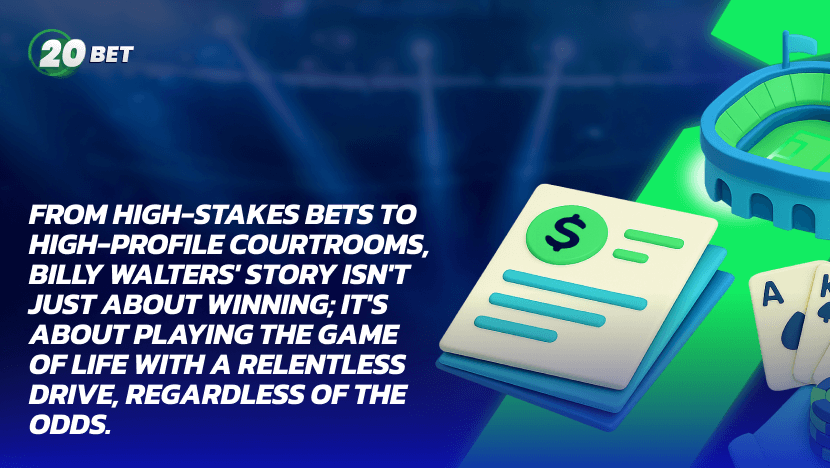I’ve interviewed plenty of sharp bettors, but no one’s reshaped gambling sports betting markets quite like Billy Walters. Mention his name around Las Vegas poker rooms and you’ll hear the same two words: success and secrecy. Ask any sportsbook manager in town, and they’ll tell you “that Billy Walters, the gambler, could tilt a line with one phone call.”
Walters claims 37 winning seasons in a row, an eye‑watering record most bettors (myself included) would kill for. Below, you’ll see how this professional gambler built his fortune, the strategy he swears by, and why his legacy still drives half the sharp action you see on NFL Sundays.

Who Exactly Is Billy Walters?
Picture a soft‑spoken southerner with a razor‑sharp eye for odds and a bankroll big enough to move lines in minutes. That’s Billy Walters. Born in 1946 in rural Kentucky, he turned a tough childhood into relentless determination.
By the time Billy Walters, the young gambler, hit Las Vegas poker events in the early 1980s, he was already tinkering with analytics and primitive computer models. This was years before “data‑driven” became sportsbook jargon. Those sessions earned him the nickname “Billy Walters Las Vegas line‑killer” among locals.
Billy Walters’ Young Life and Background
I always look for that first spark in pro gamblers; Walters’ came early in life. He started laying nickel bets on baseball at age nine – money he earned mowing lawns. His family struggled financially, so every wager felt like real risk, not play‑money practice. That acute sense of risk management later shaped his legendary discipline with a bankroll.
He wasn’t a natural math prodigy, he simply refused to ignore numbers. Walters spent late nights logging box‑score statistics from local papers, trying to spot tiny inefficiencies. It was the DIY version of today’s Python models.
Billy Walters’ Rise in the Gambling World
When Walters landed in Las Vegas, the city was still run on gut feelings and gut‑check nerves. He teamed up with like‑minded bettors to form what insiders called The Computer Group. They were arguably the first true betting syndicate that used networked PCs to crunch college‑football data.
According to one former member I spoke to, Walters’ edge came from obsessively double‑checking every input: weather, injuries, referee assignments – anything that nudged the odds a half‑point their way.
Key Strategies and Betting Techniques
- Market Timing – Walters rarely chased openers or waited for kickoff; he struck when lines deviated from his in‑house numbers by just 0.5 points.
- Diversified Wagers – Spread action across multiple sportsbooks masked Billy Walters’ picks, protecting his reputation and keeping limits high.
- Relentless Analytics – He upgraded his models regularly, adding new trends, weather factors, and predictions that few books considered.
From my own trading desk days, I can confirm that if Walters’ syndicate hit your line, the rest of the market adjusted fast. That is true influence. Seeing it firsthand gave me lasting insights into how fragile a price can be once legit expertise shows up.

Business Ventures and Investments
Walters never relied solely on betting profits. He plowed earnings into car dealerships, real‑estate projects, and a string of Las Vegas golf courses. Those investments gave him steady cash flow, insulating his wagering system from bad runs, a page every high‑stakes bettor should copy.
Away from the sports book, you could even catch a friendly Billy Walters poker game at Shadow Creek, where the blinds were anything but amiable.
Legal Battles and Controversies
Walters’ winning streak hit a wall in May 2015, when federal agents arrested him for insider trading in Dean Foods (DF) stock. Prosecutors claimed Walters reaped more than $40 million in illegal gains between 2008 and 2014, relying on tips from board member Tom Davis. After settling a civil case for profiting on the same trades, golf star Phil Mickelson was also pulled into the spotlight.
At trial in 2017, phone records and betting‑style “code messages” convinced a Manhattan jury to convict Walters on 10 counts of securities fraud and conspiracy.
He was sentenced to five years in federal prison, fined $10 million, and began serving time at FCI Pensacola. After completing roughly three‑and‑a‑half years (COVID‑19 early‑release guidelines shortened his stay), he received a presidential commutation in January 2021.
Walters still maintains the trades were legitimate long‑term investments, not quick hits – yet the saga underlines a core lesson. Even the sharpest bankroll plan can’t save you from legal missteps away from the betting window.

Impact on the Gambling Industry
Walters legitimized the idea that innovation and data could beat the lines. Sportsbooks tightened margins, third‑party analytics firms sprang up, and today’s CLV‑hunting sharp bettor owes much of the playbook to Walters’ early days. His influence is why “steam moves” trigger alarms at every major book.
Responsible Gambling
I’ve covered enough high-stakes betting rooms to know most “systems” collapse after one brutal beat. Billy Walters was different. Sitting two rows behind him at the old LV Hilton Superbook in 2004, I watched him stare at a half‑point line move, close his notebook, and walk away without placing a single wager.
No drama, no “one for the road.” That moment taught me more about bankroll survival than any betting handbook ever could. But it’s not as easy for most of us. Here are the habits I’ve tried (sometimes clumsily) to copy since.
- Edge First, Action Second – Walters passed on most games; he reportedly bet only when his model showed at least a half‑point advantage. Adopting that filter alone can keep us casual bettors from forcing plays.
- Fixed Stakes, No Exceptions – Interviews with former syndicate members confirm he stuck to preset unit sizes – often exactly 1 % of bankroll – even after big wins. That throttle prevented “heat‑of‑the‑moment” blow‑ups.
- Walk Away When Data Breaks – Walters shut down certain sports segments if injury reports or weather feeds turned unreliable. We can copy that by pausing the action when the information feels thin.
- Tools Are There – Use Them – Modern apps can track your wagers and send automatic mentorship‑style nudges when you over‑extend; risk control Walters had to master by hand. Copy that same mindset and you’ll be on the path to true bankroll mastery rather than chasing highlight‑reel wins.
The big takeaway? Celebrate the record, not the risk. Walters thrived because he treated gambling like a business with strict controls. Copy the regulations first, then worry about the winning streak.
How Did Billy Walters Become a Successful Gambler?








